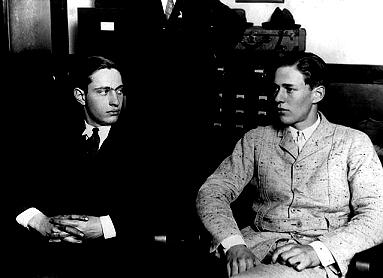
Philosophy of Human Nature
| Andrew
Mills'
Homepage |
Course
Resources
Homepage |
Dept.
of Religion
and Philosophy |
This is the Homepage for Integrative Studies 250: Philosophy of Human Nautre. From this page, using the links to the left, you will be able to access all the on-line class materials, including a syllabus, the schedule of readings, study questions, paper topics, as well as copies of any handouts and class assignments. Using the links above, you will be able to access Andrew Mills' Homepage, the Class Resources Homepage (containing links to all the courses Prof. Mills teaches) as well as the Department of Religion and Philosophy Homepage. If you ever get lost, clicking on the picture of Leopold and Loeb in the upper-left-hand corner will bring you back to this page.
The philosophical issues and topics that we will investigate all arise out of the Leopold and Loeb case of 1924--perhaps the first “Crime of the Century”. We shall become very familiar with the facts of the case as the quarter wears on, but here is an all-too-brief summary of the case. (You may have heard of it in an American history class.) Nathan Leopold and Richard Loeb were teenage geniuses who grew up in Chicago; both graduated college by the age of 19. In the spring of 1924 they kidnapped and murdered a 14-year-old boy, Bobby Franks, apparently for no other reason than to see if they could commit the perfect crime. The crime drew national headlines, and an all-out investigation by the Chicago police. Leopold and Loeb were soon caught, confessed, and acclaimed attorney Clarence Darrow was brought in to save them from the gallows. His summation was a landmark courtroom speech, and through his mastery of the law and persuasion, Darrow was able to secure life sentences for the two boys. Loeb died in prison about 10 years later, while Leopold was eventually paroled and lived the last decade of his life in Puerto Rico.
Though not apparent from that brief summary, the case is rich with philosophy. Among the topics which the case presents for us to discuss are: free will, moral responsibility, the death penatly, the nature of homosexuality, and the philosophy of the great 19th-century-philosophy Friedrich Nietzsche. We will examine the case not only through an investigation of philosophical texts, but we will read two novels: "Compulsion", which is a novelized version of the Leopold & Loeb story, and Jack London's "The Sea Wolf" which allegedly inspired Leopold & Loeb to their crime. We will also watch two movies inspired by the case: Alfred Hitchcock's classic "Rope" and "Swoon", a more recent treatment of the story.
The primary goal of this course is to gain an appreciation of the ideas and arguments which form the content of the readings. A secondary, but no less important goal, is to develop the critical thinking and writing skills essential to success in any philosophy class. It is my hope that you leave this class a better philosopher yourself, not just someone who knows something about the Leopold and Loeb case. A tertiary goal is to see how philosophical issues arise from, and inform, "real life" events. We shall spend a good deal of time interacting with the assigned texts, and doing so serves both goals: it is only by responding to the readings that we will come to understand their positions, and by engaging in a philosophic conversation with them we will hone our critical skills. The reading for this course is, at times, quite difficult, but with the help of the professor and the other students, and with a good deal of effort on your own part, you will come out of this class with a deeper appreciation of philosophy, and, I hope, a better thinker.